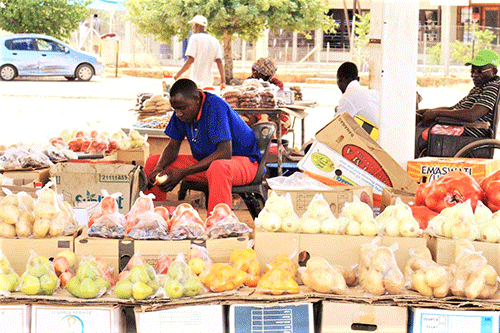Maihapa Ndjavera
An astronomical increase in prices for household oils and fats, which increased by more than 15% in March 2022 compared to 9.4% recorded during the same time last year, is beginning to take its toll on informal traders.
These substantial increases, which added more pressure on domestic households, was reflected in the price levels of cooking fats that escalated (from -2.7% to 36.6%), cooking oil (from 15.8% to 20.3%) and margarine and margarine spreads (from -1.7% to 12.3%).
When New Era visited an informal trader at the Soweto Market of Katutura, Alvina Joseph, she said business has been tough as her customers are declining.
The 40-year-old specifically lamented the escalating oil prices, which has made it extremely difficult to make a profit from selling fat cakes.
“Yoh! The moment I see the price, I just want to run away and leave everything. How can the price jump like that? We rarely make profit now. If I increase the price, no one buys, and I end up making losses. I just have to go with the flow,” narrated Joseph, who has been trading at Soweto Market for 12 years.
Trade minister Lucia Iipumbu said time has come to embrace and consume what is locally-produced in order to improve Namibia’s productive capacity through support to local suppliers, including those in the informal sector.
Iipumbu was speaking at the occasion of the “Buy Local Grow Namibia” informal sector engagements in Windhoek last week. She observed that this is critical, especially given the commodities’ supply constraints due to global phenomena such as the Russia-Ukraine conflict and the Covid-19 pandemic, which have led to an escalation of the global prices of goods and services.
About two years ago, on 1 October 2020, the trade ministry launched a national campaign to support the recovery of Namibia’s local businesses by calling on all Namibians to “#BuyLocal and #GrowNamibia” by purchasing local products first. The campaign aims to assist Namibian businesses in promoting their products and services, and encourages Namibians to support their communities by shopping locally.
Last week’s event was the recognition and inclusion of the informal sector in the above-mentioned campaign.
“It is truly a signal to the commitment we made as a ministry through the Namibia Trade Forum (NTF) to create a platform where we engage with informal traders in a bid to understand their functioning and devise modalities that will bring them into the mainstream of the economy,” stated the minister. The NTF, an agency of the trade ministry, is mandated to create platforms where such issues related to trade (whether formal or informal) can be discussed with the aim to coordinate solutions.
Earlier this year, it was reported that informal sector traders are currently the biggest employers in the Namibian
economy, accommodating at least 56% of the country’s workforce.
Furthermore, Iipumbu stated that the ministry is currently finalising an informal economy, start-ups and entrepreneurship national policy to cover the informal sections of local entrepreneurs as well as youthful
start-ups and general entrepreneurship.
“This policy is also included in the Harambee Prosperity Plan II as a key outcome of the Governance Pillar, and is to be accompanied by an attendant Act of Parliament later on, which provides ample space for ensuring the mainstreaming of incentives and business infrastructure for our MSMEs, both formal and informal”, she added. At the same event, Namib Mills’ trade specialist Arwil Viviers said the company is committed to uplifting the informal market through different initiatives.
He touched on the trade deficit, which he said is still a big challenge in Namibia.
Namibia recorded a trade deficit of N$4.6 billion for the month of May 2022. Viviers is convinced this deficit can be turned around by the informal sector to ensure that the country’s import bill, which stood at N$10.2 billion for May 2022, is reduced.
He stated: “The informal sector is the area where cross-substitution can take place, and is one of the areas to be focused on to grow the economy”. The Namibian economy remains vulnerable to external supply shocks due to its high level of imports. In this regard, the trade specialist noted that self-sufficiency is crucial, and advised the nation to focus on this aspect.
According to Viviers, the pandemic brought national self-sufficiency to the fore, particularly in terms of food security and import substitution. This situation was exacerbated even further by the Russia-Ukraine conflict. Viviers said the informal sector is one of Namib Mills’ biggest customers, and he believes it is the backbone of the economy. Through some research, Namib Mills developed and set new
products on shelves, specifically for informal traders.
“We have seen there are a lot of vendors selling fat cakes. Thus, we developed and introduced this new product to the market. We sell about 1 300 tonnes of fat cake flour, of which 60% goes into the informal sector. Of that 60% flour going to the informal sector, you then get 300 to 350 fat cakes from a 10kg bag, which is sold at about N$3. This translates into much-needed income created per fat cake trader,” Viviers reasoned.
With these figures, it is estimated that there are about 7 500 fat cake traders who purchase from Namib Mills. This, Viviers said, shows the power of the informal sector, and the potential it has to curb unemployment as well as drive the economy.


